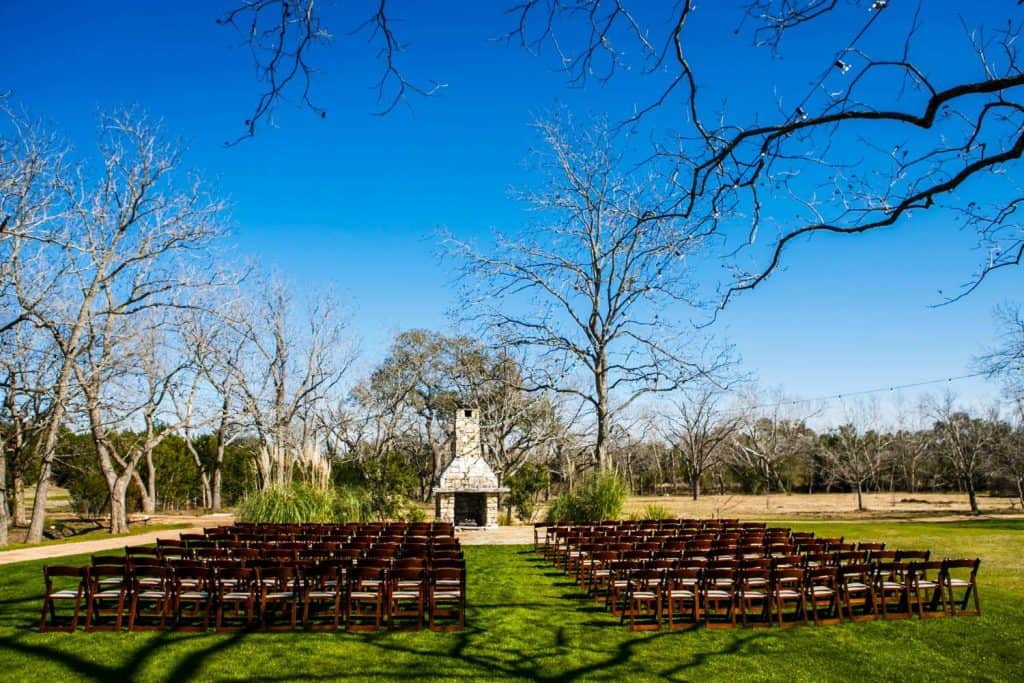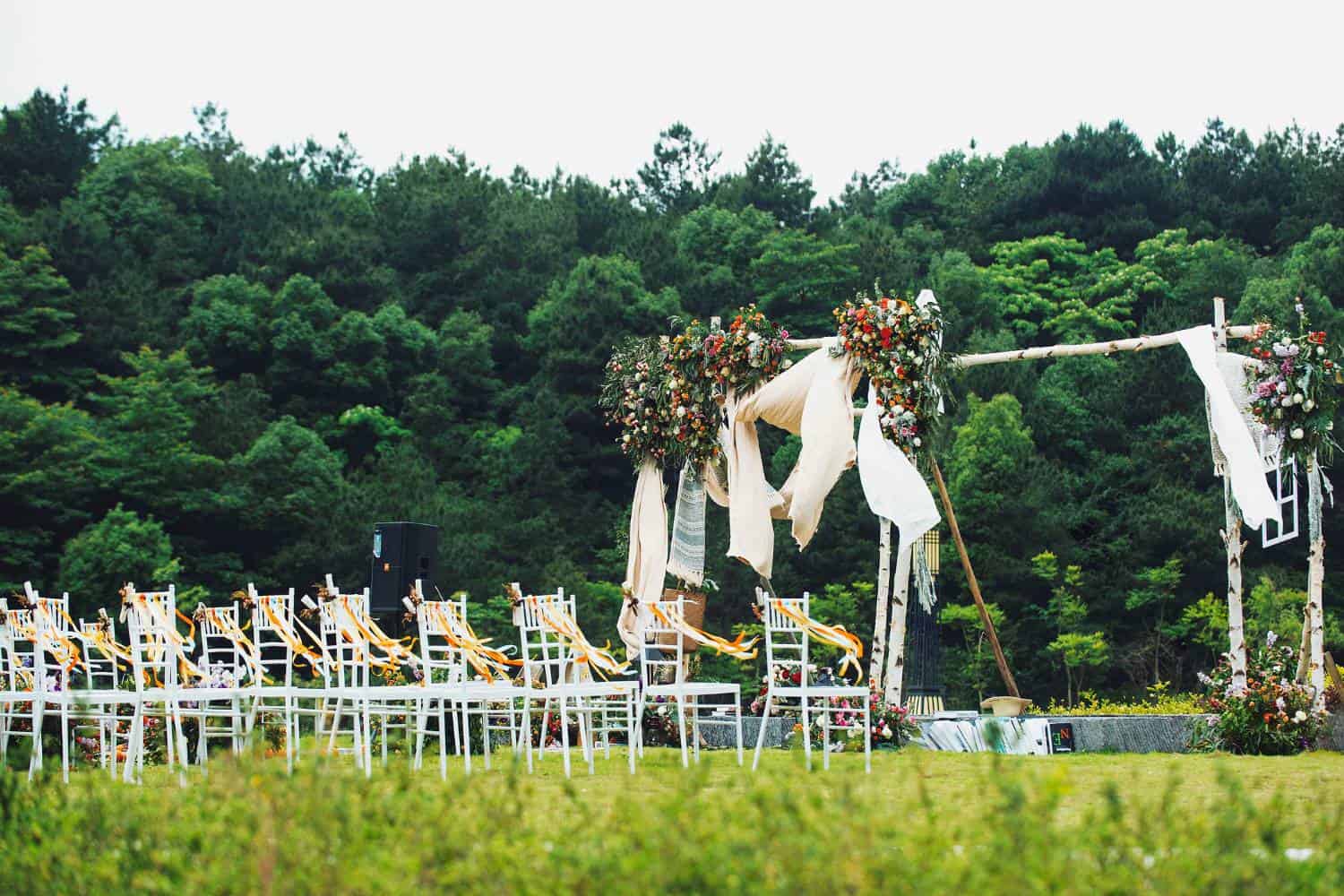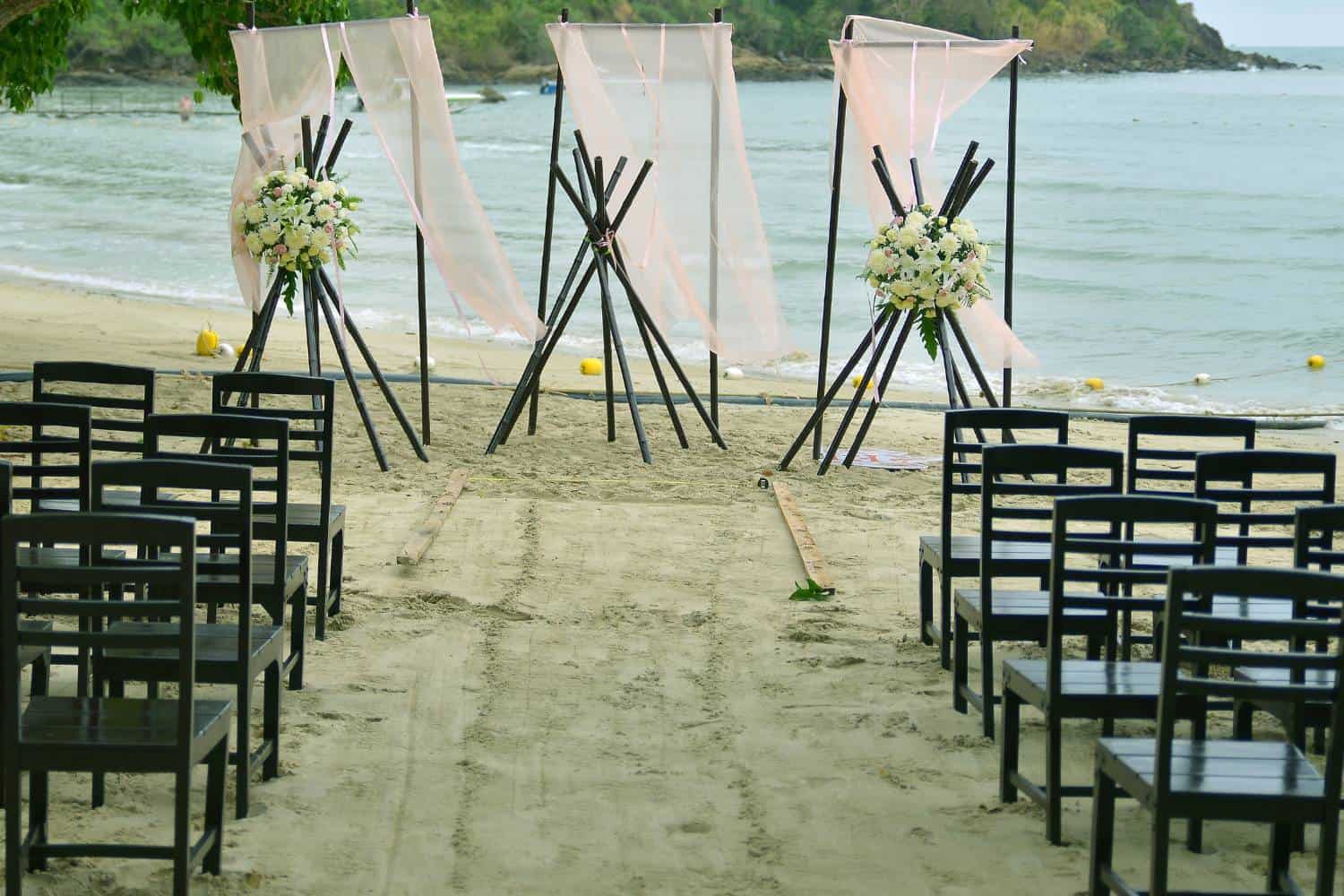As the world becomes increasingly conscious of environmental issues, many couples are opting for eco-friendly choices for their wedding ceremonies. From sustainable venues to locally sourced decor, there are numerous ways to reduce the carbon footprint of your special day. In this blog, we'll explore some of the latest trends in green and sustainable wedding venues and how you can make your celebration more environmentally friendly.
Table of Contents
Sustainable Venue Selection
Choosing a sustainable venue sets the foundation for an eco-friendly wedding celebration. Here are some of the latest trends and options to consider when selecting a venue that aligns with your values:
Gardens
Botanical gardens or private estates with lush greenery provide a stunning backdrop for a sustainable wedding. Choosing a garden venue supports conservation efforts and minimises the need for artificial decorations.
Parks
Public parks offer vast open spaces and scenic views, perfect for couples who appreciate the beauty of nature. Many parks have designated event areas and facilities, making them convenient and eco-friendly choices.
Vineyards
Wineries and vineyards are not only romantic settings but also promote sustainability through organic farming practices. Hosting your wedding at a vineyard allows you to support local agriculture while enjoying exquisite wines.
Farms
Rustic farm venues embrace the charm of the countryside and offer a genuine farm-to-table experience. Couples can incorporate farm-fresh produce into their wedding menu and support sustainable agricultural practices.
LEED-Certified Buildings
LEED (Leadership in Energy and Environmental Design) certification signifies that a building meets high standards of sustainability and energy efficiency. Many venues, including hotels, event spaces, and conference centers, now boast LEED certification, offering couples the opportunity to host their wedding in a space that prioritises environmental responsibility. LEED-certified venues often incorporate features such as energy-efficient lighting, water-saving fixtures, and renewable energy sources.
Eco-Friendly Resorts and Retreats
For couples dreaming of a destination wedding, eco-friendly resorts and retreats provide sustainable options in idyllic settings. These venues often prioritise environmental conservation and community engagement, offering guests opportunities to participate in eco-friendly activities such as beach cleanups, wildlife conservation projects, or sustainable farming initiatives. Eco-resorts may also feature green building practices, renewable energy systems, and locally sourced cuisine.
Repurposed Spaces
Repurposed venues, such as refurbished barns, warehouses, and industrial lofts, offer a unique blend of sustainability and character. These adaptive reuse projects breathe new life into old buildings, transforming them into stylish and eco-friendly event spaces. By choosing a repurposed venue, couples can minimise the environmental impact of new construction while preserving historical and architectural heritage.
Zero-Waste Event Spaces
Zero-waste event spaces are dedicated to minimising waste and promoting sustainability throughout the event planning process. These venues prioritise composting, recycling, and waste reduction strategies, ensuring that weddings hosted on their premises leave a minimal environmental footprint. From eco-friendly catering options to reusable decor and packaging, zero-waste event spaces offer couples a holistic approach to sustainable wedding planning.
Using Locally Sourced and Seasonal Decor
Couples are increasingly turning to local and seasonal decor as a means of reducing their environmental footprint while also supporting their local communities. This approach not only aligns with sustainability principles but also adds a unique, personalised touch to the wedding aesthetic. Here's why local and seasonal decor is gaining popularity and how couples can incorporate it into their special day:
- Environmental Sustainability: Selecting local and seasonal decor is an effective way to minimise the carbon footprint of a wedding. By sourcing decor items from nearby vendors and using materials that are in season, couples can significantly reduce the environmental impact of transportation and production. This eco-friendly approach helps preserve natural resources and supports local economies.
- Support for Local Communities: Opting for local decor supports small businesses and artisans within the community. Whether it's purchasing handmade centrepieces from a local artist or renting decor items from a nearby rental company, couples can directly contribute to the local economy and promote entrepreneurship. Supporting local vendors fosters a sense of community pride and ensures that resources stay within the community.
- Seasonal Charm and Beauty: Embracing seasonal decor adds a touch of charm and beauty to the wedding atmosphere. Each season offers its own palette of colours, textures, and motifs that can be incorporated into the decor scheme. Whether it's vibrant spring blooms, lush summer foliage, or rustic autumn accents, seasonal decor captures the essence of the time of year and infuses the celebration with a sense of warmth and authenticity.
- Personalization and Meaning: Incorporating local and seasonal decor allows couples to infuse their wedding with personal meaning and significance. From incorporating elements that reflect their cultural heritage to selecting decor items that hold sentimental value, couples can create a space that tells their unique love story. Personalised decor adds depth and meaning to the wedding celebration, creating cherished memories for years to come.
- Versatility and Creativity: Local and seasonal decor offers endless opportunities for creativity and customisation. From DIY projects using locally sourced materials to collaborating with local artisans on custom decor pieces, couples can let their imagination run wild and bring their vision to life. This versatility allows couples to create a wedding that is as unique and memorable as they are, while also minimising environmental impact.
Minimizing Waste and Promoting Recycling
Minimizing waste and promoting recycling are essential aspects of a sustainable wedding. Implementing eco-friendly practices throughout the event can significantly reduce the environmental impact. Here's why waste reduction and recycling initiatives are gaining prominence in the realm of sustainable weddings:
- Sustainable Practices: Green and sustainable wedding venues are embracing eco-friendly practices to minimise waste and promote recycling. From composting food scraps to using biodegradable or reusable tableware, these venues prioritise sustainability at every stage of the event. By adopting sustainable practices, couples can significantly reduce the environmental footprint of their wedding celebrations.
- Reusable and Biodegradable Materials: To minimise single-use plastics and disposable items, sustainable wedding venues prioritize the use of reusable and biodegradable materials. From bamboo dinnerware and wooden utensils to cloth napkins and linen tablecloths, these venues offer eco-friendly alternatives to traditional disposable products. By opting for reusable and biodegradable materials, couples can reduce waste and promote sustainability without sacrificing style or convenience.
- Composting Programs: Many eco-conscious wedding venues offer composting programs to divert organic waste from landfills. Food scraps, floral arrangements, and other biodegradable materials are collected and composted, turning them into nutrient-rich soil amendments. Composting programs not only reduce greenhouse gas emissions but also support soil health and promote sustainable agriculture.
- Recycling Initiatives: Recycling initiatives play a crucial role in waste reduction efforts at sustainable wedding venues. Facilities equipped with recycling stations make it easy for guests to dispose of recyclable materials such as glass, plastic, paper, and aluminum. These venues work closely with waste management companies to ensure that recyclable materials are properly sorted and processed, minimising waste sent to landfill.
- Donate or Repurpose: After the wedding, consider donating leftover food to local shelters or food banks and repurposing decor items for future events or home decor projects. Instead of discarding perfectly good items, couples can contribute to community organizations and support those in need. Donation programs not only reduce waste but also foster a spirit of giving and social responsibility.
Carbon Neutrality Initiatives
Offsetting carbon emissions is a popular strategy for couples looking to reduce the environmental impact of their wedding. Many venues now offer carbon offset programs that allow couples to compensate for the emissions generated by their event through investments in renewable energy projects or reforestation efforts.
- Partnering with Carbon Offset Providers: Choose a wedding venue that partners with reputable carbon offset providers to offer carbon-neutral wedding packages. These packages typically include a calculation of the event's carbon footprint and a corresponding investment in carbon reduction projects.
- Educating Guests: Raise awareness about the importance of carbon offsetting among your guests by providing information about the program and encouraging them to participate. Consider incorporating eco-friendly transportation options such as carpooling or providing shuttle services to further reduce emissions.
Eco-Friendly Catering Options
Food and beverage choices play a significant role in the sustainability of a wedding. Opting for sustainable catering options not only supports local producers but also minimizes waste and promotes ethical practices.
- Farm-to-Table Menus: Choose a caterer that specializes in farm-to-table cuisine, sourcing ingredients from local farmers and producers. Seasonal menus not only showcase the best flavors of the region but also reduce the carbon footprint associated with long-distance transportation.
- Zero-Waste Practices: Work with your caterer to implement zero-waste practices such as composting food scraps and using reusable or biodegradable servingware. Buffet-style dining can also help minimise food waste by allowing guests to choose portion sizes according to their preferences.
- Plant-Based Options: Consider offering plant-based menu options or hosting a fully vegetarian or vegan reception. Plant-based diets have a lower environmental impact compared to animal-based diets and can appeal to guests with diverse dietary preferences.
Sustainable Energy Solutions
Choosing a wedding venue with a focus on energy efficiency can significantly reduce the environmental impact of your event while also saving on energy costs. As couples strive to reduce their carbon footprint and make eco-friendly choices for their special day, energy efficiency has become a key consideration when selecting a wedding venue. Here's why energy efficiency is gaining momentum in the realm of sustainable weddings:
- Solar-Powered Venues: Solar-powered wedding venues are leading the way in energy efficiency, harnessing the power of the sun to meet their electricity needs. From rooftop solar panels to ground-mounted arrays, these venues generate clean, renewable energy on-site, reducing reliance on fossil fuels and minimising greenhouse gas emissions. Solar-powered venues not only contribute to a more sustainable future but also showcase the potential of renewable energy technology.
- Energy-Efficient Lighting: Lighting accounts for a significant portion of energy consumption at wedding venues, making energy-efficient lighting solutions a top priority for sustainable venues. LED (light-emitting diode) and CFL (compact fluorescent lamp) fixtures use less energy and last longer than traditional incandescent bulbs, reducing electricity usage and maintenance costs. Dimmer switches, motion sensors, and programmable lighting systems further optimise energy efficiency by adjusting lighting levels based on occupancy and natural light conditions.
- Natural Ventilation and Cooling: Venues designed with natural ventilation systems and passive cooling techniques maximise energy efficiency by reducing the need for artificial heating and air conditioning. Well-placed windows, skylights, and operable vents allow for cross-ventilation and airflow, maintaining comfortable indoor temperatures without relying on mechanical HVAC systems. Green roofs, vegetated walls, and shade structures help insulate buildings and mitigate heat gain, further reducing energy consumption.
- Energy-Efficient Appliances and Equipment: From kitchen appliances to heating and cooling systems, energy-efficient equipment plays a crucial role in reducing energy consumption at wedding venues. ENERGY STAR-certified appliances and HVAC (heating, ventilation, and air conditioning) systems meet high standards of energy efficiency and performance, helping venues minimise their environmental impact and operating costs. Smart thermostats, energy management systems, and power-saving features further optimise energy usage and enhance sustainability.
- Off-Grid and Microgrid Solutions: Off-grid and microgrid solutions offer sustainable alternatives to traditional grid-connected power systems, providing resilience and reliability in remote or environmentally sensitive locations. Off-grid wedding venues generate their own power through renewable energy sources such as solar, wind, or hydroelectricity, allowing couples to celebrate in pristine natural settings without relying on external utilities. Microgrid systems integrate renewable energy resources with energy storage and distribution technologies, enabling venues to optimize energy usage and reduce reliance on centralised power grids.
Eco-Friendly Wedding Ring Options
Selecting ethically sourced wedding rings is an important aspect of sustainability that often goes overlooked. By choosing rings made from responsibly mined or recycled materials, couples can support ethical practices and reduce the environmental impact of the jewelry industry.
- Fair Trade and Conflict-Free Diamonds: Look for wedding rings that feature fair trade or conflict-free diamonds, which are mined and sourced ethically without contributing to human rights abuses or environmental degradation. Certification from organizations such as the Kimberley Process ensures that diamonds are sourced responsibly.
- Recycled Metals: Consider wedding rings made from recycled precious metals such as gold or platinum, which require less energy and resources to produce than newly mined metals. Many jewellers offer recycled metal options and can customise designs to suit your preferences.
- Alternative Materials: Explore alternative materials such as lab-grown diamonds, moissanite, or sustainable wood for unique and eco-friendly wedding ring options. These materials offer ethical and environmentally conscious alternatives to traditional precious metals and gemstones.
Conclusion
Couples seeking to align their wedding celebrations with eco-conscious values have an array of green and sustainable venue options to consider. From picturesque gardens and scenic parks to rustic farms and repurposed spaces like refurbished barns, the choices are abundant and diverse. Vineyards and LEED-certified buildings also offer sustainable settings, promoting organic farming practices and energy efficiency, respectively. Additionally, eco-friendly resorts and retreats provide idyllic destinations for couples looking to minimise their environmental footprint while enjoying picturesque surroundings and engaging in sustainability-focused activities.
In addition to venue selection, couples are increasingly turning to locally sourced and seasonal decor to reduce their carbon footprint and support their communities. By opting for handmade or locally sourced decor items, couples not only contribute to environmental sustainability but also add personal touches to their wedding aesthetic. Embracing seasonal decor not only enhances the charm of the celebration but also supports local economies and fosters creativity. Furthermore, minimising waste through recycling initiatives, offering sustainable catering options, and embracing energy-efficient solutions such as solar power and LED lighting are becoming integral aspects of planning eco-friendly weddings. Ethical considerations extend to wedding rings as well, with couples opting for ethically sourced or recycled materials to minimise the environmental impact of their jewellery choices.
Content Summary
- As environmental consciousness rises, couples seek eco-friendly wedding options.
- Sustainable venues and decor choices reduce wedding carbon footprints.
- Gardens offer lush backdrops while supporting conservation efforts.
- Public parks provide scenic spaces for nature-loving couples.
- Vineyards promote sustainability through organic farming practices.
- Rustic farm venues offer authentic farm-to-table experiences.
- LEED-certified buildings prioritise sustainability and energy efficiency.
- Eco-friendly resorts provide sustainable options for destination weddings.
- Repurposed spaces like refurbished barns blend sustainability with character.
- Zero-waste event spaces minimise waste with composting and recycling.
- Locally sourced and seasonal decor reduces environmental impact.
- Local decor choices support small businesses and artisans.
- Seasonal decor adds charm and beauty to wedding atmospheres.
- Personalised decor infuses weddings with meaning and significance.
- Versatile local decor options allow for creativity and customisation.
- Waste reduction initiatives at weddings minimise environmental impact.
- Reusable and biodegradable materials are prioritised at sustainable venues.
- Composting programs divert organic waste from landfills.
- Recycling initiatives ensure proper disposal of recyclable materials.
- Donation and repurposing of leftover items reduce wedding waste.
- Carbon neutrality initiatives offset wedding carbon emissions.
- Partnering with carbon offset providers helps achieve carbon-neutral weddings.
- Educating guests raises awareness about carbon offsetting.
- Sustainable catering options support local producers and minimise waste.
- Farm-to-table menus showcase regional flavors and reduce transportation carbon footprint.
- Zero-waste practices in catering minimise food waste and single-use items.
- Plant-based menu options appeal to diverse dietary preferences.
- Energy-efficient wedding venues reduce environmental impact.
- Solar-powered venues harness renewable energy for electricity needs.
- LED lighting and natural ventilation optimise energy efficiency.
- Energy-efficient appliances and equipment minimise energy consumption.
- Off-grid and microgrid solutions offer sustainability in remote locations.
- Ethically sourced wedding rings support responsible mining practices.
- Fair trade and conflict-free diamonds ensure ethical sourcing.
- Recycled metals for wedding rings reduce the need for new mining.
- Alternative materials like lab-grown diamonds offer eco-friendly options.
- Sustainability in wedding planning aligns with broader environmental goals.
- Eco-conscious couples prioritise venues with green certifications.
- Local and seasonal decor choices reflect regional culture and resources.
- Waste reduction practices at weddings contribute to a cleaner environment.
- Carbon offset programs mitigate wedding carbon emissions.
- Eco-friendly catering options reduce the environmental impact of weddings.
- Energy-efficient lighting solutions enhance wedding venues sustainably.
- Sustainable agriculture practices are supported through wedding menu choices.
- Recycling and composting initiatives divert wedding waste from landfills.
- Ethical sourcing of wedding rings promotes responsible jewellery industry practices.
- Conservation efforts are supported through sustainable wedding choices.
- Renewable energy solutions at wedding venues reduce reliance on fossil fuels.
- Community engagement is fostered through eco-friendly wedding activities.
- Environmental responsibility in wedding planning sets a positive example for guests and future generations.
Frequently Asked Questions
Sustainable wedding venues prioritise eco-friendly practices such as energy efficiency, waste reduction, and supporting local ecosystems.
Research online directories and eco-friendly venue lists, or consult with wedding planners specialising in sustainable events. Directly inquire with venues about their sustainability practices and certifications.
Not necessarily. While some may have higher upfront costs, others offer competitive pricing. Couples may also find savings through reduced energy consumption or inclusive sustainability packages.
Look for features like energy-efficient lighting, water-saving fixtures, and sustainable waste management. Consider location, transportation options, and the venue's support for local vendors.
Communicate your priorities with the venue and choose vendors sharing your commitment to eco-friendliness. Consider carbon offsetting initiatives, donation programs, and incorporating locally sourced elements into your wedding.



